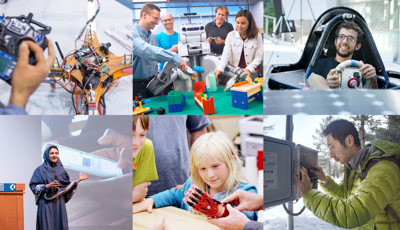The June 2008 newsletter is now online, with two stories on key energy projects in both engine development and predicting solar availability for utilities.
UC Berkeley
The headquarters of CITRIS and the Banatao Institute are located in Sutardja Dai Hall (SDH) on the UC Berkeley campus. Specially designed to house this interdisciplinary research institute, the building contains 141,000 sq. feet of laboratory space for collaborative research, faculty offices, the 149-seat Banatao Auditorium, conference rooms on each floor, and modern classrooms. SDH also hosts the CITRIS Invention Lab, a rapid prototyping space used by UC entrepreneurs in our CITRIS Foundry startup accelerator program and the student maker community. The Marvell Nanofabrication Laboratory occupies a two-story, 15,000-square-foot wing of Sutardja Dai Hall where academic and industry researchers develop prototypes for new biosensors, photonics devices, and other MEMS/NEMS sensors. SDH is equipped with hundreds of sensors and sophisticated systems for building management that form a living laboratory on campus for energy research and proof-of-concept demonstrations.
2008 CITRIS Seed Funding successfully launches projects
Currently, CITRIS has awarded approximately $2 million inseed grants on all four campuses. These projects will help fulfillthe CITRIS mission of creating societal-based research through collaborationsacross the CITRIS campuses.
Energy Shock: Perspective by Dan Kammen
A perspective by Professor Daniel Kammen on the energy crisis and the role of the C-GRACE meeting with CITRIS and the Copenhagen Climate Council.
Cell Phone as a Platform for Healthcare Awards from MSR
CITRIS projects at Berkeley and Santa Cruz using cell phones as a
healthcare platform are among the projects supported by a recent Microsoft Research initiative.
GPS, Cell Phones, and Rush Hour featured on ABC News
A research project between UC Berkeley and Nokia tests how well cell phone GPS can gauge
upcoming traffic and is featured online here.
Winners announced for Big Ideas contest
Six projects were awarded a total of $30K at this year's CITRIS Big Ideas contest, with the top two prizes going to healthcare-related issues.
Low-cost fuel cell project wins CET competition
A group that wants to make a cheap fuel cell that can efficiently convert hydrocarbon fuel into
electricity won this year's CET Cleantech Innovation Contest.
UCSC computer scientists develop solutions for long-term storage of digital data
Ethan Miller's group has come up with a new approach, called Pergamum, which uses hard
disk drives to provide energy-efficient, cost-effective storage.
Newsletter online: CellScope, and Eye care in India
The April newsletter features stories about technology for social impact: CellScope (cell phone + microscope) and enabling eye care in India using cheap, reliable Wi-Fi.
Green Technology Entrepreneurship Academy, July 7 – 11, 2008
The Green Technology Entrepreneurship Academy (GTEA)
provides science and engineering research faculty, post-docs and doctoral
students with the necessary knowledge and skills to move environmentally
sustainable and green technology research out of the laboratory and into
practice.
Professor Daniel Fletcher
Dr. Dan Fletcher is an associate professor in the bioengineering department and biophysics program at the University of California, Berkeley, where his research focuses on the biophysics of cell movements and the cytoskeleton and development of biomedical devices. Recent work from his laboratory includes direct measurement of the actin networks that drive crawling motility, development of vesicle encapsulation technology for cellular reconstitution, and demonstration of fluorescence microscopy on a mobile phone.
Graduate Student’s work featured in MoMA Exhibit
Matthew Scullin, Graduate Student in the Department of Materials Science and Engineering at UC Berkeley, is part of a collaborative exhibit currently on display at the Museum of Modern Art in New York City.
Intel and Microsoft launch Par Lab at UC Berkeley
UC Berkeley is partnering with Intel and
Microsoft to accelerate developments in parallel computing and advance the
powerful benefits of multi-core processing to mainstream consumer and business
computers.
Severin Borenstein
Severin Borenstein is E.T. Grether Professor of Business Administration and Public Policy at the Haas School of Business and Co-Director of the Energy Institute at Haas.
Banks, phone companies are identity-theft targets
A recent study by CITRIS researchers shows that banks and telecommunications companies are top targets for identity-theft.
Demand Response Presentations Online
The Demand Response Enabling Technology Development project (DR ETD) held a meeting of its Technical Advisory Committee on February 19, 2008. Presentations of this meeting […]
Carbon calculator debuts
The latest edition of the CoolClimate Calculator shows people as well as cities and businesses how their lifestyles contribute to
global warming and identifies areas where they can reduce their footprint.
Video from Chris Somerville’s talk is available
The video from Chris Somerville's talk on "Development of Cellulosic Biofuels" is now available online.
Digital education and air monitoring projects win awards
An online mystery game in which student sleuths will monitor air pollution in
South Central Los Angeles and in Cairo, Egypt, and a project using cell phones
to teach English to children in India have won funding for two UC Berkeley professors
Demand Response Research Featured on Local TV News
UC Berkeley PhD student Dan Steingart and his research on printable batteries was recently featured on a television news story by Bay Area ABC7 News.
View news story
Next-generation nuclear power and Monitoring air quality
Read about innovative work at CITRIS in the latest newsletter, now on-line.
Alexandre Bayen
Director, CITRIS and the Banatao Institute
California Seeks Thermostat Control
A recent NY Times articles discusses the challenge and possible solutions to California's concerns about available energy, including the Demand Response project at CITRIS.
Joint Nokia research project to capture traffic data
Researchers from the University of California, Berkeley, and Nokia recently tested technology that could
soon transform the way drivers navigate through congested highways and
obtain information about road conditions.



